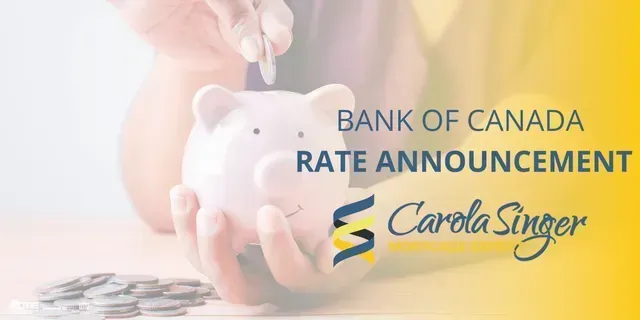Bank of Canada Rate Announcement Jul 24th, 2024
Bank of Canada reduces policy rate by 25 basis points to 4½%.
FOR IMMEDIATE RELEASE
July 24, 2024
The Bank of Canada today reduced its target for the overnight rate to 4½%, with the Bank Rate at 4¾% and the deposit rate at 4½%. The Bank is continuing its policy of balance sheet normalization.
The global economy is expected to continue expanding at an annual rate of about 3% through 2026. While inflation is still above central bank targets in most advanced economies, it is forecast to ease gradually. In the United States, the anticipated economic slowdown is materializing, with consumption growth moderating. US inflation looks to have resumed its downward path. In the euro area, growth is picking up following a weak 2023. China’s economy is growing modestly, with weak domestic demand partially offset by strong exports. Global financial conditions have eased, with lower bond yields, buoyant equity prices, and robust corporate debt issuance. The Canadian dollar has been relatively stable and oil prices are around the levels assumed in April’s Monetary Policy Report (MPR).
In Canada, economic growth likely picked up to about 1½% through the first half of this year. However, with robust population growth of about 3%, the economy’s potential output is still growing faster than GDP, which means excess supply has increased. Household spending, including both consumer purchases and housing, has been weak. There are signs of slack in the labour market. The unemployment rate has risen to 6.4%, with employment continuing to grow more slowly than the labour force and job seekers taking longer to find work. Wage growth is showing some signs of moderating, but remains elevated.
GDP growth is forecast to increase in the second half of 2024 and through 2025. This reflects stronger exports and a recovery in household spending and business investment as borrowing costs ease. Residential investment is expected to grow robustly. With new government limits on admissions of non-permanent residents, population growth should slow in 2025.
Overall, the Bank forecasts GDP growth of 1.2% in 2024, 2.1% in 2025, and 2.4% in 2026. The strengthening economy will gradually absorb excess supply through 2025 and into 2026.
CPI inflation moderated to 2.7% in June after increasing in May. Broad inflationary pressures are easing. The Bank’s preferred measures of core inflation have been below 3% for several months and the breadth of price increases across components of the CPI is now near its historical norm. Shelter price inflation remains high, driven by rent and mortgage interest costs, and is still the biggest contributor to total inflation. Inflation is also elevated in services that are closely affected by wages, such as restaurants and personal care.
The Bank’s preferred measures of core inflation are expected to slow to about 2½% in the second half of 2024 and ease gradually through 2025. The Bank expects CPI inflation to come down below core inflation in the second half of this year, largely because of base year effects on gasoline prices. As those effects wear off, CPI inflation may edge up again before settling around the 2% target next year.
With broad price pressures continuing to ease and inflation expected to move closer to 2%, Governing Council decided to reduce the policy interest rate by a further 25 basis points. Ongoing excess supply is lowering inflationary pressures. At the same time, price pressures in some important parts of the economy—notably shelter and some other services—are holding inflation up. Governing Council is carefully assessing these opposing forces on inflation. Monetary policy decisions will be guided by incoming information and our assessment of their implications for the inflation outlook. The Bank remains resolute in its commitment to restoring price stability for Canadians.
Information note
The next scheduled date for announcing the overnight rate target is September 4, 2024. The Bank will publish its next full outlook for the economy and inflation, including risks to the projection, in the MPR on October 23, 2024.
Read the July 24th, 2024 Monetary Policy Report





